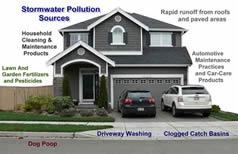
welcome to the city of hubbard public works storm drainage page
We All Contribute to the Health of Our Waterways!
The actions we take as individual citizens contributes to the health of the streams, rivers and ponds. Everyday activities such as working on your lawn, washing your car, and sprucing up the exterior of your home can cause storm water pollution and can negatively impact the quality of our waterways - if we don't take proper precautions.
The average homeowner applies seven times more chemicals to their lawn than a farmer does per acre. Excessive application of fertilizers and pesticides on our lawns can be washed away by sprinklers and rain, ending up in storm drains that empty into the nearest stream or waterway.
Many of us try to save money by changing our automobile or lawnmower's oil, antifreeze and other fluids. Do you know how to properly dispose of these used products? Most of us know that these materials should never be dumped into a storm drain or waterway, but we may still unwittingly contribute to storm water pollution if we change these fluids in our driveways. Rain water or hoses may wash excess into the street and down the storm drain. Leaky vehicles that are parked outside can have the same negative effect.
The City adopted a Storm Drainage Master Plan in October 1996. Since this plan's adoption, the City has completed approximately 50% of Phase One, and 25% of Phase Two of the recommended improvements in this plan.
Unfortunately, due to the elimination of one of the State's funding sources, and an updated SDC (System Development Charge) plan which does not allow the City to collect storm drainage SDC's, the City does not anticipate any further storm drain projects to take place in the near future.
Stormwater Hotline: 503.982.9429
Now that you've decided to become a good environmental citizen, what should you do if you witness someone else polluting a storm drain or other waterway? Call the City of Hubbard's Storm Water Hotline at 503.982.9429 if you see any of the following occurring in your neighborhood:
- Dumping into storm drains;
- Dumping in Mill and/or Bear Creeks; or
- Excessive soil erosion or runoff around development, construction sites.
Polluted storm water can lead to fish kills, destruction of wildlife habitat, loss of aesthetic value, impaired recreational areas and contaminated drinking water resources.
You can help keep our waterways clean and clear by reporting and preventing possible sources of storm water pollution!
